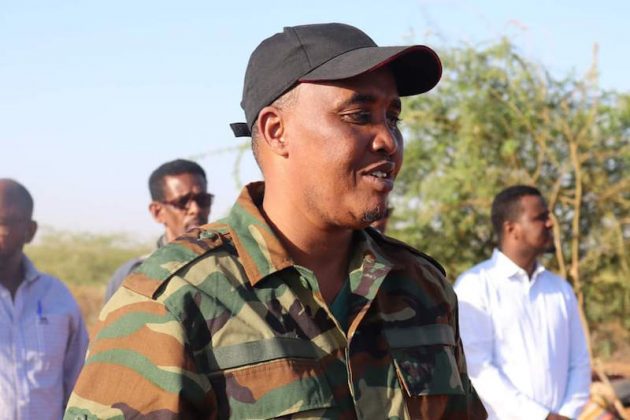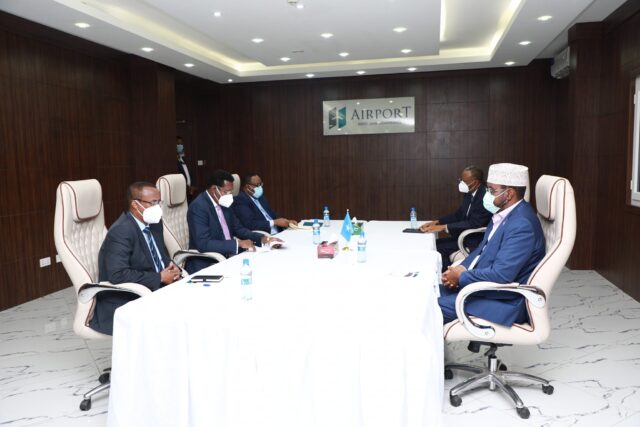
Let me start with a simple but speculative question. Which side will come out victorious and win the biggest loot in the upcoming Halane meeting between Somalia FGS and FMS political leaders?
Two days before theFederal government’s term ended on 8th February, the leaders of the Federal government and the Federal Member States met in Dhusomareb in a last ditch attempt to break the impasse over the Federal parliamentary elections but any hope to ward off the looming constitutional crisis over the imminent mandate expiry of the Federal parliament and the president was dashed when the two sides failed to reach an agreement on, inter alias, the two most contentious issues: the election administration of Gedo region and the selection of the Election Committee for north-western constituencies (Somaliland). Both sides did not seem to care about the consequences of the impending unprecedented constitutional legitimacy deficit and the fragility of the newly found Somalia peace and state building
In reality, the causes of the present crisis are not related to the model and management of the elections but stem from the power struggle between the different factions of Somalia’s political elite over the control of the next Federal parliament. The leaders of the Federal government are alleged of unscrupulous attempts to misappropriate the elections in order to stage their return to power for a second term. The leaders of Puntland and Jubaland are alleged of similar practices of leveraging their power to ensure the election of the candidates they support in their States. In short, both sides are conniving to steal the parliamentary elections.
Historically, the Federal government and Federal Member States have never agreed and cooperated on any substantive policy about the country’s peace and state building unless donor funds were involved. The breakdown of the negotiations indicates that both sides, for their selfish reasons, do not intend to promote free and fair electionsas there is no incentive for them to support transparency and accountability and since they can go about their corrupt practices with impunity. Any agreement that can project both sides to be victorious in the negotiations and whichcould increase their chances of influencing the election of their hand-picked candidates, in other words “stealing the election for their candidates”, would be acceptable to them.
Here we must ask two important questions. What is the significance of this scramble over the Election Committees? The second question is whether there is such a practical model which could grant both sides the chances to loot more parliament seats for their candidates?
Before we attempt to answer the first question, let us look at what is at stake here. The Parliament is the most important institution in modern states. It has the powers to elect the president, the powers to grant and withdraw confidence from the executive branch, the powers to hold the government to account on its acts, and the powers to make the laws of the land that the judiciary applies. But these powers are derived from the legitimacy bestowed on them as the representatives of the people. In democratic countries, the members of the parliament are directly elected by and remain accountable to the people; in Somalia, they are indirectly selected by tribal chiefs and powerful politicians using bribery, nepotism and other corrupt practices. Although these MPs remain loyal to the politicians who aided and abetted them to be selected, at the same time their votes are stereotypically soldto the highest bidder when it comes to presidential election.
Therefore, the parliamentary seats are invaluable in both monetary and political power dynamics. The Election Committees will be responsible for not only managing the elections but managing the selection of the election delegates who will elect members of parliament (MPs). These delegates, while their votes are on sale, could also be swayed to vote for certain candidates by other means.
The Election Committees do the biddings of the political leaders who appointed them. The illegitimate use of unrestrained power by Somalia political leaders in unfair and fraudulent selection of candidatesfor parliamentary seats through the Election Committees has been laid bare by recent comments of Puntland President Mr Said Abdullahi Deni. The president flaunted his power by promising the return of Mr Mahad Awad to parliament. He said “if Mahad Awad chooses to take his seat to Puntland, I will pledge that I will make him an MP”. In another occasion during the celebrations of the third anniversary of Puntland government, one female poet nicknamed Mrs Dianna requested the audiences to entreat the president so he can give her a seat in the Federal parliament.
The answer to the second question could be found in the 2016 indirect election model. This election model was considered to be the most fraudulent election process that was ever staged in Somalia. It was not only marred by election irregularities at the highest possible occurrence that anyone could have imagined, butit became the most filthily expensive election in Somali history whereby some candidates spent around US Dollar 1 million to buy delegate’s votes overtly and shamelesslylike animals in an open market.
The 2016 elections, while unique in their excessive corruption and mismanagement, had shifted the power dynamics from the clan elders who had traditionally selected members of the parliament in previous elections to regional political leaders. In this new model, a scheme was devised to ensure that the political leaders had the ultimate decision on the conduct of the elections so that they could share the spoils: FMS leaders would rob the elections in their capital cities and FGS leaders would rob the elections held in Mogadishu. It was a win-win situation.
The proposed new model for 2021 election is quite different in that the elections are taking place in 11 locations. The leaders of the Federal government have insisted on increasing the number of election sites so that they can increase their chance of robbing more seats. The leaders of the Federal Member States are fighting to retain their share of the loot. Any model that could return the robbery status quo could be acceptable but that will mean the leaders of the Federal government resigning themselves to accept small share of the loot. It might mean holding the elections in 5 locations; State capitals and Mogadishu.
Another alternative approach to solve the deadlock is to bring back the selection of candidates and the right of representation to whom the right belongs to; “the clans led by their elders” and wrench it away from the hands and influences of politicians. If the clans of Gedo and Somaliland are given the authority and ability to make their choices, neither Farmajo nor Ahmed Madobe would have fought over them.
At this critical time, all eyes are on the international community as the last resort to help Somalia navigate these turbulent election times. The international community has finally taken their role by inviting both sides to the negotiation table and moving the meeting venue to a neutral space in Halane compound. They have taken a stand against partial or parallel election processes and restrained the unpredictable behaviour of President Farmaajo. But that in itself is not enough. The international community should support the Prime Minister and his cabinet to act as a caretaker government that has the mandate to hold elections within months and the creation of an environment that is conducive for elections. Similarly they should pressure regional leaders to avoid electorate manipulation which has produced Members of Parliament who do not represent anyone but their pockets in the past.
Abdirahman Said Bile is a researcher mainly interested in State building, Security and international studies and Good Governance.
He can be emailed on: Saedbile@gmail.com
Opinions expressed in this article are the author’s own and do not necessarily reflect the editorial policy of Puntland Mirror.






